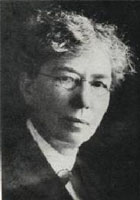Old Botany Bay Poem by Dame Mary Gilmore
Old Botany Bay
"I'm old
Botany Bay;
stiff in the joints,
little to say.
I am he
who paved the way,
that you might walk
at your ease to-day;
I was the conscript
sent to hell
to make in the desert
the living well;
I bore the heat,
I blazed the track-
furrowed and bloody
upon my back.
I split the rock;
I felled the tree:
The nation was-
Because of me!
Old Botany Bay
Taking the sun
from day to day...
shame on the mouth
that would deny
the knotted hands
that set us high!
Dame Gilmore certainly captures the cantankerous nature of some elderly persons seemingly at the ready to give some implicitly - if not explicitly - scolding advice to anyone who'll listen; and she projects that image well upon Botany Bay (south of Sydney) . The poem does cause one to appreciate the hard work of those who've gone before us for the betterment of society. Yet, perhaps the poem captures the ''preachy'' tone of elderly persons a little too well and without enough humor, because it was rather off-putting, at least to me.
This poem has not been translated into any other language yet.
I would like to translate this poem
'Old Botany Bay' by Dame Mary Gilmore, acknowledges the convict heritage of Australia and pays tribute to the convicts who broke in so much of colonial Australia, allowing the birth of a prosperous nation. Botany Bay is both old and important in the colonial history of Australia. This is the site, of Captain James Cook's first landing of HMS Endeavour on the continent of Australia on 29 April 1770, following his discovery and extensive navigation of New Zealand in 1769. Gilmore personifies this site with the lines 'I'm old/ Botany Bay; / stiff in the joints, / little to say' as the first stanza. Botany Bay was the planned British site for a penal colony and Captain Arthur Phillip, was ordered to establish the first European habitation of Australia there. But Botany Bay had neither a secure anchorage nor a reliable source of fresh water, so in 1788 Phillip chose Sydney Cove instead, founding the city of Sydney. In stanza two Gilmore declares 'I am he/ who paved the way, / that you might walk/ at your ease to-day; ' establishing a definite debt of gratitude, by later generations enjoying a good life, due to the traditional theme of settlers hard work and necessary labour. But the twist is this debt is owed to ‘the conscript/ (a hidden reference to convicts) sent to hell/ to make in the desert/ the living well; ’ and largely whenever previously possible, written out of the history of Australia. Stanzas four and five give a brief history of how these conscripts, turned the desert into a living well, with the development of parts of the interior continent. The harsh punishment many of these conscripts experienced, is beautifully described in the double meaning of ‘track-/ furrowed and bloody/ upon my back.’ The tracks blazed into both the land and whipped conscripts. ‘The nation was-/ Because of me! ’ ending the forth stanza, spotlights Gilmore’s theme in the final fifth stanza, ‘shame on the mouth/ that would deny/ the knotted hands/ that set us high! ’ These conscripts had ‘little to say’ because they were written out of history; and ‘Old Botany Bay/ Taking the sun/ from day to day...’ also extends this metaphor of debt owed. Botany Bay, a few kilometres south of the Sydney central business district, implies these rich business people, can enjoy the sun; due to the labour of conscript convict ‘knotted hands’; which established the foundation of this later wealth, ‘in the desert/ the living well’ of the nation of Australia. Many wells were drilled in the interior to supply water to the huge cattle and sheep ranches that followed and the bounty beef and wool provided for the economy of Australia.